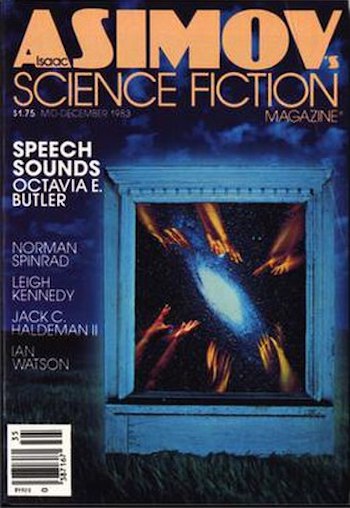The premise of Octavia Butler’s 1983 short story “Speech Sounds,” which won the Hugo for Best Short Story in 1984, is that humanity has lost the ability to use language due to some sort of illness that appeared suddenly three years before the story begins. The effects are described as “stroke-like” and “highly specific,” and language is lost and not regained. This illness can also lead to paralysis, intellectual impairment, memory loss, and death. Society has collapsed into violent chaos, but, for some reason, left-handed people are less affected by the urge for violence.
People in this setting can still vocalize: they can roar, grunt, and squawk. In linguistics, the term “speech sounds” refers to the sounds that people use to create language, and this is the domain of phoneticians. Speech sounds include the entire range of sounds that can be made with the vocal tract, from bilabial fricatives (as in Spanish haber) to velar stops (/k/ and /g/) to glottal stops (the sound in uh –’uh), to implosives, ejectives, and clicks, which are not found in most European languages. The key feature of “speech sounds” is that listeners identify them as speech. Roars, grunts, and squawks aren’t speech sounds—but in this setting, they are the only vocalizations left to (most) people.
There are two aspects of language development and processing underlying this. First, neurologists have described two main areas of the brain associated with language production and comprehension. Broca’s area is linked to language production—speaking, writing, and gesturing. When the area is damaged, it can lead to Broca’s, or expressive, aphasia, which is the inability to express oneself fluently using language. A person with expressive aphasia knows what they want to say but can’t get it out. Wernicke’s area is linked to language comprehension, which includes written, spoken, and gestured language. Damage to this area can lead to Wernicke’s, or fluent, aphasia, in which a speaker can produce syntactically correct speech fluently, but it has no meaning. A third type of aphasia, global, is a combination of both of these. Strokes can affect both of these parts of the brain and cause aphasia, but modern speech pathologists can help people recover some language ability.
The effects in this story don’t map perfectly to any sort of aphasia. Rye, the story’s protagonist, has the ability to speak and understand spoken language (although she hides it), but can no longer read or write. Inability to read and write is closest to Wernicke’s aphasia, but she can produce fluent, meaningful speech—which suggests that it isn’t Wernicke’s. Obsidian, her ally, can read, but he can’t speak or understand spoken language—which, again, doesn’t line up with either. People can still communicate, and they have even developed a new set of obscene gestures, which a group of young men use to indicate what Rye should do with them. Rye thinks, after she learns that Obsidian can read, that the illness took away what they valued most, suggesting that the illness itself had some sort of agency. (And in SF, why not?)
The other aspect of language development underlying it is the critical period. This is the well-supported theory that there is a window in a child’s cognitive development during which they have the ability to acquire language if they are exposed to it, and, if they do not acquire language during this period, they never will. The first famous example of this is the so-called Wild Boy of Aveyron, who was found in 1800, age twelve, in the woods in France. He had no language ability, and he was studied by various researchers to find out if they could teach him and what he could learn. He never acquired language. His case is fraught with the basic (racist) assumptions of 1800s France: the association of language and intellect, whether one can educate Others in their colonies. The second famous example of this is Genie, an American child who was isolated and abused by her parents when she was a child, then rescued and given experimental speech therapy in the 1970s. She was able to acquire vocabulary rapidly, but her grammar and syntax were lacking. She could, however, use nonverbal communication well, inventing a system of pantomimes and gestures, as well as drawing things or using pictures from magazines to relate experiences.
This seems to be closest to the effects of the illness in this story, at least for the majority of people. Somehow, this illness shut off the ability to use verbal language, while allowing nonverbal communication to thrive. Yet some fraction of the population retained the ability to speak, read, or write. The entire population has some form of aphasia, which is kind-of-but-not-exactly like aphasias in the real world. Society descends into violence and chaos, as if language and speech are what create and sustain civilization. Whether that’s true is a philosophical question. But there is a glimmer of hope at the end, as Rye finds two children who can speak, and—introducing herself by her name, Valerie Rye, for the first time in a long, long time, “savoring the words” —she takes them in.
CD Covington has masters degrees in German and Linguistics, likes science fiction and roller derby, and misses having a cat. She is a graduate of Viable Paradise 17 and has published short stories in anthologies, most recently the story “Debridement” in Survivor, edited by Mary Anne Mohanraj and J.J. Pionke.










